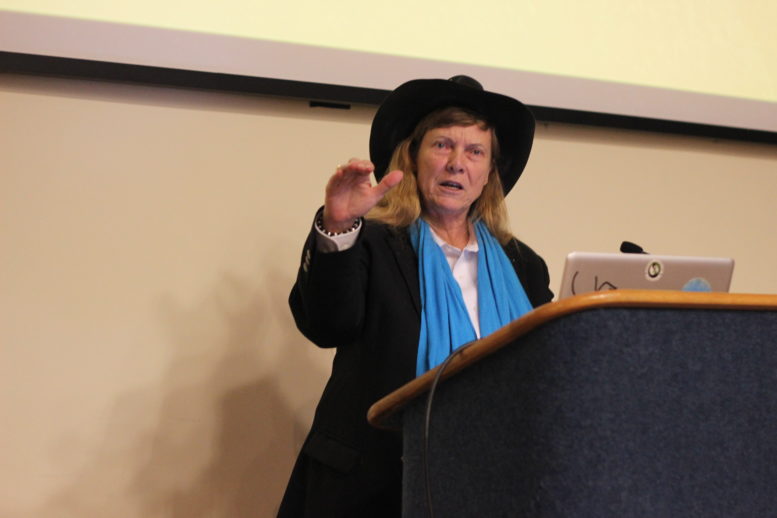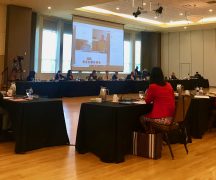By DAVID DUPONT
BG Independent News
Speaking on the day that Donald Trump started reversing the country’s commitments to combat global warming, author and entrepreneur Hunter Lovins had some news for him. “The era of fossil fuel is over,” she said. “I don’t care what Mr. Trump does.”
Lovins, the founder of Natural Capital Solutions and author of 1 books with another in the works, is a proponent of using capitalist solutions to combat global warning. Tuesday night she took the stage at Bowling Green State University as the Edward Lamb Peace lecturer to promote her views.
In his introduction, political scientist professor Mark Simon noted that the lecture series originally started dealing with military threats to world peace. When the Cold War ended, it was determined that environmental issues now posed the greatest threat to world peace.
Lovins was the latest in a long line of noted environmentalists to speak.
Climate change has already sparked or contributed to conflicts in Darfur and Syria, and driven 65 million people from their homes, Lovins said. That will only get worse as the global temperatures rise. The Middle East is projected to become too hot to live in by the year by 2040.
A study funded by NASA found that “total system collapse will be difficult to avoid” if current patterns of resource depletion and economic inequality continue. That means no water, no food, and no money.
Lovins cited a survey that found that the eight richest individuals on the planet control more wealth that the bottom 50 percent.
As bleak as that picture is, she took a different tack, inspired in part by folk singer Pete Seeger who said: “The key to the future is finding the optimistic stories and letting them be known.”
That’s why Lovins was at BGSU.
The conventional economic story, shaped in the wake of 1947 by a group of economists and politicians, is that people are “greedy bastards.” Individual choice within a market free of government interference is the best way.
This neo-liberal ideology took hold around the world. In the United States it got a boost when the U.S. Chamber of Commerce solicited a report from soon—to-be Supreme Court Justice Lewis Powell on how to stem the rise of socialism among young people.
That spurred well-financed efforts to create lobbying efforts and think tanks, such as the American Enterprise Institute and the Heritage Foundation.
Before 1980, Lovins said, everyone in the United States was getting wealthier. Since then, the year Ronald Reagan was elected, income disparity has grown dramatically.
Barack Obama, supposedly the most liberal president ever, was actually in economic terms more conservative than Reagan, she said.
But, Lovins said, Homo sapiens survived because they could cooperate and create.
Lovins advocates for a regenerative economy in contrast to degeneration of the current system.
Farmers in the Midwest who were going broke using conventional farming methods are now making money with more sustainable models, which actually soak up carbon from the atmosphere rather than spewing out more.
Those changes are taking place on a global scale. The world came together to sign the Paris Accords to take action to combat climate change. Through Trump’s actions, she said, “we are going against all the other nations on earth.”
Companies are increasingly looking at sustainability practices because they mean they are operating in a more efficient way. That means profits. The corporate leaders in sustainability report higher return on investment than those who are less aggressive in those regards and earn a lot more than those who ignore sustainability.
Walmart requires its suppliers to report on how sustainable their operations are and what their carbon footprint is. “When Walmart goes green, you know there’s a business case,” she said. “They’re not doing this out of the goodness of their hearts.”
While millions of companies are pledging to completely convert to renewable resources, the fortunes of fossil fuel companies are declining.
Saudi Arabia has put its national oil company up for sale, and is devoting massive resources to developing solar power. Other Gulf States are also moving toward solar.
“Renewable energy is creating 10 times the number of jobs” as fossil fuels, she said.
If the world is to stop global warming, the unused stocks of fuels will not be burned. What will go up in flames are the companies who own those resources, which are now stranded assets just like the underwater real estate in the 2008 crash.
Investors, Lovins said, must be wary. The crash in 2008 “should have been a wake-up call.”
Despite a divestment movement that has drained $5 trillion in assets out of fossil fuel investments, stock and bond funds, including those held by public pension funds and university endowments, continue to hold fossil fuel holdings.
She supports a form of evergreen investing. This would involve institutional funds buying companies that produce goods that have steady demand but little growth potential. The new owners can encourage sustainable methods without worrying about shareholders demanding unreasonable growth.
“The pension fund gets a forever stream of revenue, and the company gets a brand they can maintain.”
Lovins said, she’s part of an effort to create Change Finance, an investment fund focused on sustainable firms.
She advised people to watch for its launch in June.
Lovins remains optimistic that “a finer future is possible.” That future will “unleash the greatest prosperity the word has ever known.”





